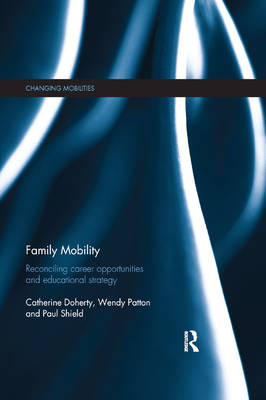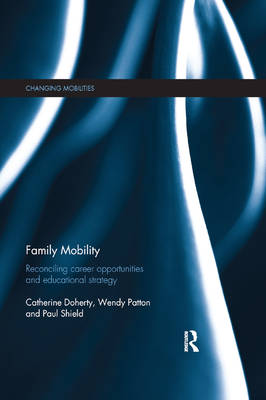
- Afhalen na 1 uur in een winkel met voorraad
- Gratis thuislevering in België vanaf € 30
- Ruim aanbod met 7 miljoen producten
- Afhalen na 1 uur in een winkel met voorraad
- Gratis thuislevering in België vanaf € 30
- Ruim aanbod met 7 miljoen producten
Family Mobility
Reconciling Career Opportunities and Educational Strategy
Catherine Doherty, Wendy Patton, Paul ShieldOmschrijving
Family mobility decisions reveal much about how the public and private realms of social life interact and change. This sociological study explores how contemporary families reconcile individual members' career and education projects within the family unit over time and space, and unpacks the intersubjective constraints on workforce mobility.
This Australian mixed methods study sampled Defence Force families and middle class professional families to illustrate how families' educational projects are necessarily and deeply implicated in issues of workforce mobility and immobility, in complex ways. Defence families move frequently, often absorbing the stresses of moving through 'viscous' institutions as private troubles.
In contrast, the selective mobility of middle class professional families and their 'no go zones' contribute to the public issue of poorly serviced rural communities. Families with different social, material and vocational resources at their disposal are shown to reflexively weigh the benefits and risks associated with moving differently. The book also explore how priorities shift as children move through educational phases. The families' narratives offer empirical windows on larger social processes, such as the mobility imperative, the gender imbalance in the family's intersubjective bargains, labour market credentialism, the social construction of place, and the family's role in the reproduction of class structure.
Specificaties
Betrokkenen
- Auteur(s):
- Uitgeverij:
Inhoud
- Aantal bladzijden:
- 236
- Taal:
- Engels
- Reeks:
Eigenschappen
- Productcode (EAN):
- 9780367868659
- Verschijningsdatum:
- 12/12/2019
- Uitvoering:
- Paperback
- Formaat:
- Trade paperback (VS)
- Afmetingen:
- 155 mm x 231 mm
- Gewicht:
- 340 g

Alleen bij Standaard Boekhandel
Beoordelingen
We publiceren alleen reviews die voldoen aan de voorwaarden voor reviews. Bekijk onze voorwaarden voor reviews.











